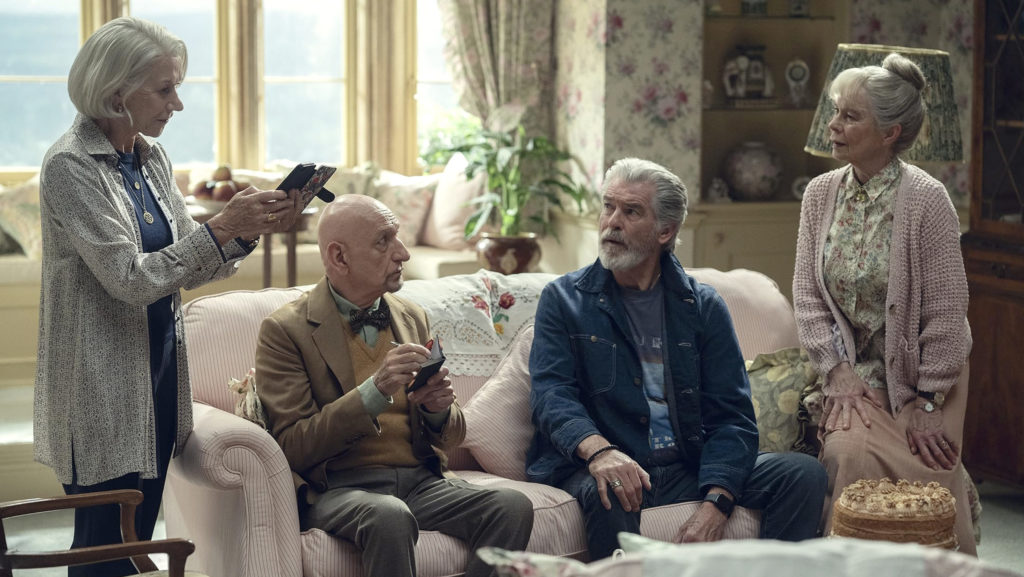“The Thursday Murder Club” on Netflix is the kind of pop-culture fluff that I like to consume and write about regularly.
It is an entertaining and mostly inoffensive murder mystery with an all-star cast, a big production budget and centered around a ridiculously high-end idyllic retirement home. And as all British mystery movies and series reveal, these little patches of paradise are steeped in mayhem and are more dangerous than the New York City subway at 3 in the morning.
I say mostly inoffensive because after all, this is a mainstream film made in 2025, the kind that asks a Catholic viewer like me to establish a sort of cultural détente with the content. So when questionable and overtly immoral acts that give the story context are portrayed but not endorsed, I keep watching with an open mind. This is where the content and I are in “peace talks,” so to speak.
Immoral acts appearing in art are not automatic disqualifiers for me. “Macbeth” is not a play unless there is murder and a dalliance with the dark arts. The qualifying component is the regicide, and the occult plot points were the propellant driving the play and its main character to a tragic end. There was and still is, no suggestion these immoral acts are anything other than intrinsically disordered.
In that sense, “The Thursday Murder Club” was doing fine as I traded in about 90 or so minutes of the remaining life I have on earth to watch this escapist faire suspending my disbelief while watching 70-year-olds solve both a cold case murder and an active investigation in one fell swoop.
I found a lot to like about “The Thursday Murder Club,” the actors had chemistry with one another, and although the plot was confusing and a little too convenient at times, it was not a complete waste of my time. But all good things must end, and for me, that end came toward the conclusion of this film.
The “old folks” had taught the “young folks” some new tricks, they saved the day, and their retirement home as well, and justice was served … or at least justice as viewed through a secularist/materialist prism.
When the last dastardly act is committed, the villains are exposed, and mystery is solved, the story has one last bit of unfinished business, and this is where the peace talks between me and pop-culture entertainment consumption broke down.
The next-to-final resolution of the story involves euthanasia coupled with a suicide. Unlike “Macbeth,” these two actions are treated as innately good. The characters in the movie view this combo plate of anti-life sentiment as sad, but not in the least bit as morally indefensible. Rather, the characters and the people who made this film see the killing of an enfeebled woman and the suicide of her husband as kind of “good” for both. If this had happened at the beginning of the movie instead of at the end, I would have turned it off.
Recently, Bishop Daniel E. Thomas of Toledo, Ohio, issued a pastoral letter that sums up so succinctly what I was feeling about this little piece of pop culture fluff. No, the good bishop was not writing about how murder mysteries are supposed to end. His topic was a lot deeper and profound. Titled “The Body Reveals the Person,” it deals with gender ideology and how it separates human beings from their very selves.
In this letter that is filled with compassion with those with gender dysphoria and other complicated issues, the bishop spoke about “Dualism and the Ethics of Human Life.” Reading it, it occurred to me that he could have been writing about the Netflix show I’d just watched.
“If one thinks the body is good not in itself but only insofar as it enables one to participate in other humanly good activities,” Thomas writes, “one easily assumes that it is merciful to end the life deliberately of people incapable of participating in those activities.”
For me, two “little” sentences in the bishop’s expansive letter came to my rescue in a moment of feeling cynical and tempted to lambaste this movie with moral outrage. “Our personhood is beloved by God. It is sacred.”
They are apt words not only for the intended audience of this pastoral letter, but they also apply quite nicely to those who make popular culture entertainment as well as those who consume it. The bishop has lit a candle of truth to shine on any darkness that may come into range.

